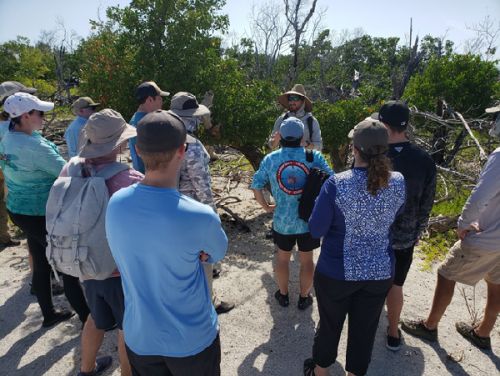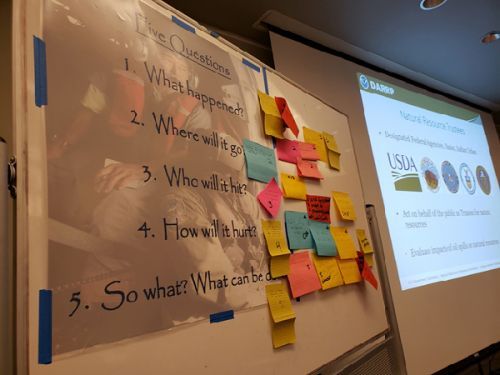Oil Spill Response Training in the Florida Keys
FEBRUARY 24, 2020 — During the week of February 10, NOAA’s Office of Response and Restoration (OR&R) held the first Science of Oil Spill (SOS) class of 2020, training 38 students from five federal agencies, one state agency and two industrial companies at the Florida Keys National Marine Sanctuary (FKNMS) Eco-Discovery Center in Key West, Florida.
Students were primarily from the U.S. Coast Guard (21 students) with a majority of those from either Sector Key West or District 7 in Miami. Students also came from other parts of NOAA, the U.S. Navy, the Environmental Protection Agency, the PHMSA (Pipeline and Hazardous Materials Safety Administration), Phillips 66, Marathon, and from the Florida Department of Environmental Protection.
OR&R instructors for the class were Bradford Benggio (lead SSC), Paige Doelling, Gary Shigenaka, Dylan Righi, and Kevin Kirsch. Lisa Symons with the Office of National Marine Sanctuaries briefed students on local resources at risk, as well as marine ecology, and Kimberly Albins was the class facilitator.
During this five-day course, students were taught a range of topics from chemistry, fate and transport of oil, to response protocols and Natural Resource Damage Assessment. The class partnered with the Boy Scouts of America for a field trip to their Brinton Environmental Center, the FKNMS Newfound Harbor Sanctuary Preservation area for a quick and low-visibility snorkel on the coral reef and out to Big Munson Island where students learned about response alternatives for vulnerable coastal shorelines, including the different mangrove species and the critical role they play within the coastal environment. Students also had the opportunity to visit their on-site coral nursery to learn about coral restoration efforts in the Florida Keys.
Visiting instructor, Dr. Abby Renegar from NOVA Southeastern, shared results from research on the toxicity of oil on corals, mangroves and other habitats and a review of 32 years of study of oil and dispersed oil effects on coral, mangroves and seagrass from the Tropical Oil Pollution Investigations Coast Systems (TrOPICS) project.
The class was a great success with new knowledge gained and new partnerships forged. The training will help prepare many within the local response community for the March full-scale Preparedness Response Exercise Program (PREP) oil spill exercise to be hosted by the U.S. Coast Guard in Key West.
For more information, contact Kimberly.Albins@noaa.gov.
 An official website of the United States government.
An official website of the United States government.


